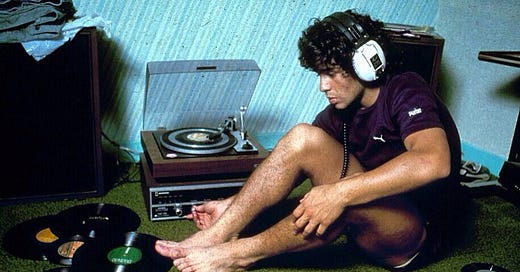Saturday Night Traxx_112820
Now Dance Sounds: Waajeed, Shanique Marie & Finn, Huachuma Music, Dayglo Maradona (Andrew Weatherall mix), The Revolutionaries
There have been few dance nights in my life as consistently memorable as Wednesdays before Thanksgiving. I missed it deeply this year.
Waajeed’s been on an undeniably hot, no-BS streak since at least 2017’s Shango EP, one set of classic Detroit heaters after another. (Also: his Detroit Love mix from last year.) Long-time Detroit bedrock, this fall he’s rolled out a new project called Underground Music Academy, “a community music hub, which aims to build the future leaders of independent electronic music.” That’s where proceeds from these Acts of Love mixtapes are going. “That Ain’t Right” is the stand-out from the first tape. It’s a street-report-cum-history-lesson, with a tough synth-line, a snare-rim beat, police sirens, and vocalist Kels Perry channeling the energies that coalesced between summers of 1967 and 2020. It’s an anthem for those who—and those who can’t imagine techno being political. [Bonus: the mixtape also has a cut called “They Think” which is an interesting rethink of Colonel Abrams’ “Trapped,” a track that I danced into the ground in high school.]
Shanique Marie is one of the vocalists in the great Equiknoxx Music collective, Finn McRory is a Manc DJ/producer, and “Lifey” is a wonderful piece of booming dance-floor pop. It’s built on one of the surest riddims going—Lyn Collins/JBs’ “Think” a.k.a. Rob Base/EZ Rock’s “It Takes Two”—and a space-echo synth that sounds like chopped and filtered steel drum. At its core, it’s the best kind of simple: Marie sounds off how she “can’t wait to see you again,” lauding a “love at first sight” that lasts the length of the song’s title, while the synths bounce off the walls and carry the song’s melody in freestyle-era fashion. But Finn raises the stakes by mutating the clave-based bottom in-out of the mix like the tides, never letting the track settle for into formula. It is, instead a series of wonderful weird miniatures, which retain the feeling that in a parallel universe, “Lifey” would be a Top 40 hit.
It was my love for contemporary cumbia (electro and otherwise) that helped me find Hawaii Bonsai, a Swiss label with a questionable name, yet one that consistently releases great percussive records with Latin American roots. Huachuma Music is Joel Velasco, a Peruvian producer who lives in Rennes, France, where he throws a party called Boom Tropical, and makes tracks mixing South American folk music with electronics and drum machines. Huachuma is a sacred plant that’s been used by indigenous cultures of western South America for centuries, making it among the oldest recorded psychedelic medicines. “Dance of the Queros” is all bass sequencer, synth FX, dubbed-out flute loops, folk vocal samples, and layers of percussion both programmable and hand-played. The vibe is early Chicago house was made in the Andes. It’s not for everyone, but then again a heady trip into the depth of rhythm and ceremony never is.
Pour one out for Diego Armando Maradona—if not the greatest professional male footballer of all-time, then certainly one of only three who deserve the accolade. Moreover, his strength of character (at times questionable, never reserved) as a 20th century sports celebrity who spoke truthfully in the political and social sphere, is rivaled only by Muhammad Ali’s. He also used the pitch like a cumbia villera dance-floor (video evidence). The original “Rock Section” is a 1979 single by Brit post-punks Skin Tight, and was given an acid-house era “remix” by Julian Cope; it has no actual connection to the man who passed away Wednesday, besides Cope’s adoption of his surname as a pseudonym. But this 2014 version does unite Maradona with another cultural giant who left us in this year: “the Guv’nor” Andrew Weatherall comprehended the world as more than the sum of its individual stories, often combining its parts in the most humanist of ways. Weatherall’s remix of Dayglo Maradona’s “Rock Section” follows his usual late-in-life remix pattern, setting up layers of oscillating analog synths (Roland Space Echo, Korg MS 20 sequencer) and motorik drum machines, and riding riding them into a fading sunset. Which seems apropos this week.
Last night we watched the Lovers Rock episode of Steve McQueen’s Small Axe — and it’s beyond massive. The film follows an early ‘80s West London a birthday bash in the Caribbean community, from set-up (cooking, outfit choices, soundsystem wiring), to huge party goings-on (old friends lost, new friend found), and aftermath (bus-ride home). It also includes the two finest naturalist scenes of people interacting with DJ’d music in on a dance-floor that I’ve seen in quite some time—maybe ever. Intimate, sensual, emotional, political, exultant, animated, dreamy, giving the sense and breadth of individual feelings, as well as collective sentiments. The incredible scene with Janet Kay’s “Silly Games” will get a lot of plaudits, and rightfully so, a beautiful party pastoral where the women and lovers take over (acapella). But do not ignore it’s version-side companion in the film, a punk-rock-like, almost exclusively male explosion of energy that comes pouring out when the selector cues up The Revolutionaries’ original reading of the “Kunta Kinte” riddim. It opens with a sonar sound effect, an apocalyptic call-out, before turning into an aggressive drum-heavy skank, a reggae barn-stormer that’s also a disco mosh-pit. A setting that had been convivial turns rugged and chaotic, yet understandably so. The camera almost gets swallowed up by the tumult, verges on drowning, yet survives to live its life. It is magnificent as metaphor and piercing as fact.


